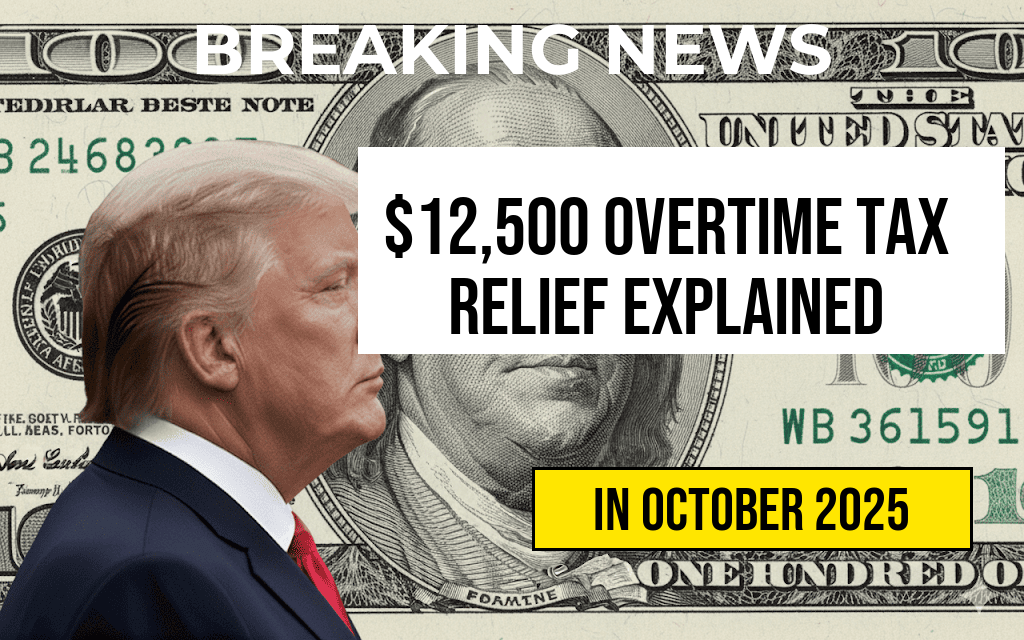Major Tax Breaks for Low-Income Retirees: How a $4,000 Deduction Boost Could Reduce Your Tax Bill by Over $400
Retired Americans with modest incomes are set to benefit significantly from recent tax policy enhancements, notably a substantial increase in the standard deduction for low-income seniors. The IRS has expanded the **$4,000 deduction boost** for qualifying retirees, a move aimed at easing financial burdens during retirement years. For eligible seniors, this could translate into a reduction of over $400 in their federal tax liability, providing a welcome boost to fixed incomes strained by inflation and rising healthcare costs.
This adjustment comes as part of broader efforts to support vulnerable populations, including seniors with limited resources. The increased deduction is designed to make the tax system more equitable, recognizing the unique financial challenges faced by retired individuals who often rely solely on fixed incomes from Social Security, pensions, or savings. With the new rules in place, many low-income retirees can expect to see tangible savings when filing their taxes this season.
Understanding the $4,000 Deduction Boost
The IRS’s recent modification effectively increases the standard deduction available to seniors earning below certain income thresholds. Previously, the standard deduction for seniors was the same as for the general population, but the new policy introduces a supplemental deduction of up to **$4,000** for qualifying low-income retirees.
This deduction is primarily targeted at individuals aged 65 and older whose income falls below specific limits, typically around $20,000 for singles and $30,000 for married couples filing jointly, depending on filing status and other criteria. The adjustment aims to reduce the taxable portion of their income, resulting in lower overall tax bills.
How Much Can You Save?
The actual savings depend on each retiree’s income, filing status, and other deductions. To illustrate the potential impact, consider a single senior with an annual income of $15,000 from Social Security and a small pension. Without the deduction boost, their taxable income remains relatively high compared to their actual financial capacity.
With the new $4,000 deduction enhancement, their taxable income could be reduced by this amount, potentially lowering their tax liability by more than $400—assuming a marginal tax rate of 10% to 15%. Married couples with similar income levels can see even more significant savings, sometimes exceeding $800.
**Sample Tax Savings Estimation:**
| Filing Status | Income | Deduction Boost | Estimated Tax Reduction |
|—————–|———-|—————–|————————-|
| Single | $15,000 | $4,000 | Over $150 |
| Married Filing Jointly | $18,000 | $4,000 | Over $180 |
(*Note: Actual savings depend on specific tax brackets and additional deductions.*)
Eligibility Criteria and How to Claim
To qualify for the increased deduction, seniors must meet certain requirements:
- Age: 65 years or older
- Income: Below the specified threshold (varies by year and filing status)
- Filing status: Single, married filing jointly, or head of household
- Residency: Must be a U.S. resident for the tax year
Eligible taxpayers should ensure they claim the deduction appropriately by reporting it on Schedule R (Credit for the Elderly or Disabled) or through other applicable forms, depending on their specific tax situation. Consulting IRS Publication 524 or a qualified tax professional can help clarify eligibility and maximize benefits.
Implications for Retirement Planning
The enhanced deduction emphasizes the importance of strategic tax planning for retirees. Recognizing how deductions impact overall tax liability can influence decisions about withdrawals from retirement accounts, investment strategies, and charitable contributions. For many seniors, the new policy offers an opportunity to stretch their fixed incomes further.
Financial advisors recommend reviewing current tax returns and projected income early in the year to estimate potential savings. This proactive approach can help retirees adjust their financial plans and ensure they’re taking full advantage of available benefits.
Additional Support Measures
Beyond the increased deduction, other programs are also designed to assist low-income seniors. These include the **Earned Income Tax Credit (EITC)**, the **Saver’s Credit**, and various state-level assistance programs. Combining these resources can significantly reduce tax bills and increase disposable income.
For more detailed information on federal benefits available to seniors, visit the [IRS website](https://www.irs.gov/individuals/irs-benefits) or consult reputable sources like [Wikipedia’s overview of retirement](https://en.wikipedia.org/wiki/Retirement).
Conclusion
The recent boost to the $4,000 deduction for low-income retirees marks a meaningful step toward tax fairness, offering tangible relief to seniors navigating financial challenges. By understanding eligibility criteria and strategic planning, eligible individuals can potentially reduce their federal tax bills by over $400, easing their financial burdens and enhancing their quality of life during retirement.
Frequently Asked Questions
What is the new deduction boost available for low-income seniors?
The new policy provides a $4,000 deduction boost for low-income retirees, helping to significantly reduce their taxable income and overall tax liability.
How can this deduction help me reduce my tax bill?
This deduction boost can potentially lower your tax bill by over $400, making it easier for low-income seniors to retain more of their retirement income.
Who qualifies as a low-income senior for this benefit?
Eligibility is generally based on income level and retirement status. Seniors with income below a certain threshold and meeting specific criteria can qualify for the $4,000 deduction boost.
How do I claim this increased deduction on my tax return?
To claim the boosted deduction, you should report it on your tax return using the appropriate forms, such as Schedule A for itemized deductions, and ensure you meet all qualification requirements.
Are there any other benefits available for seniors related to taxes?
Yes, in addition to the $4,000 deduction boost, seniors may be eligible for other tax credits and deductions, like the Senior Tax Credit, medical expense deductions, and benefits for retirement account withdrawals.










